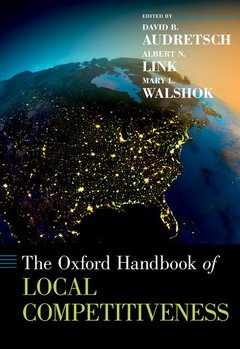Description
The Oxford Handbook of Local Competitiveness
Oxford Handbooks Series
Coordinators: Audretsch David B., Link Albert N., Walshok Mary Lindenstein
Language: English
Subjects for The Oxford Handbook of Local Competitiveness:
Publication date: 09-2015
528 p. · 18.2x25.4 cm · Hardback
528 p. · 18.2x25.4 cm · Hardback
Description
/li>Biography
/li>
The local levels of economies have felt the impact of technological change and globalization. These forces have triggered the need to understand the dynamic mechanisms that enable locales to respond to such changes. For example, the downsizing of traditional employers because of a major loss in market share due to new competitors, acquisition by global firms, or off-shoring of production or services was traditionally thought to be beyond the scope of powers of local policy makers, thinkers, and business leaders. In the world of practice, those concerned about the economic performance of place-city, region or state-are increasingly focused on how to adapt to these trends and leverage their existing resources to respond to these global challenges as a positive opportunity. The Oxford Handbook of Local Competitiveness brings together some of the leading minds in the fields of business, economics, and the social sciences to identify, articulate, and analyze what influences and shapes local competitiveness and what places can do to enhance their economic performance. The contributors to the Handbook provide a body of systematic analyses suggesting that the local context is a critical element of the forces that shape competitiveness. The challenges to generate and sustain economic performance vary across places, and the factors and conditions that either enhance or impede competiveness also are place-specific. Finally, the characteristics and nature of what constitutes success also vary across places. This Handbook is essential reading material for academics in the fields of economics and public policy, as well as business leaders who hope to gain a more in-depth understanding of their field. Informative and intellectually rigorous, The Oxford Handbook of Local Competitiveness is the definitive volume of scholarly analysis regarding the relationship between place and economic competition.
David B. Audretsch is a Distinguished Professor and Ameritech Chair of Economic Development at Indiana University, where he also serves as Director of the Institute for Development Strategies. He is also an Honorary Professor of Industrial Economics and Entrepreneurship at the WHU-Otto Beisheim School of Management in Germany. In addition, he serves as a Visiting Professor at the King Saud University in Saudi Arabia, and is a Research Fellow of the Centre for Economic Policy Research in London. Albert N. Link is Professor of Economics at the University of North Carolina at Greensboro (UNCG). He received, with honors, a B.S. in mathematics from the University of Richmond in 1971 and a Ph.D. in economics from Tulane University in 1976. After receiving the Ph.D., he joined the economics faculty at Auburn University, where he remained until he joined the economics faculty at UNCG in 1982. Professor Link's research focuses on technology and innovation policy, the economics of R&D, and policy/program evaluation. He is currently the Editor-in-Chief of the Journal of Technology Transfer. Mary Lindenstein Walshok is Associate Vice Chancellor, Public Programs, Dean, University Extension and Adjunct Professor of Sociology at the University of California, San Diego. Professor Walshok is a leading thinker on aligning workforce development with regional economic growth and innovation. As an industrial sociologist, she has been researching various American regions for the US Department of Labor, NSF, and Lilly Foundation. One of her current research projects is an NSF-funded study of the role of boundary-spanning organizations in shaping the social and cultural dynamics of highly innovative regions.
© 2024 LAVOISIER S.A.S.
These books may interest you

The Oxford Handbook of Management 152.43 €



